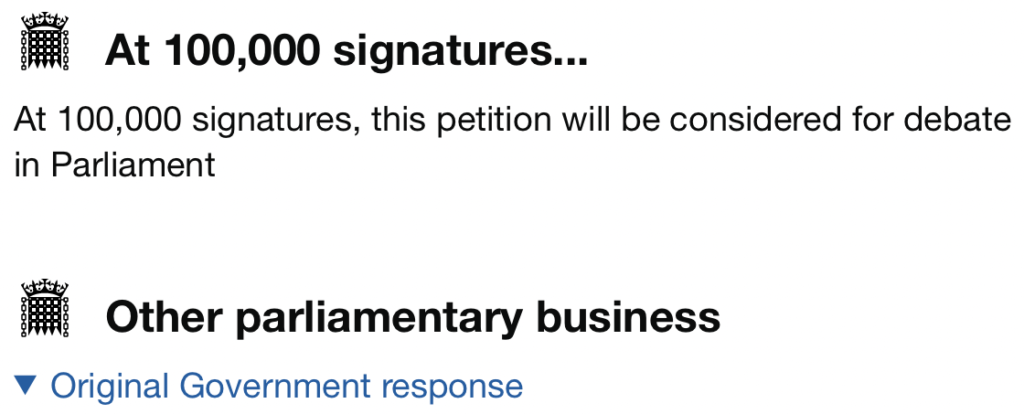We are concerned that Parliament has not discussed and will not have a say on the 307 proposed amendments to the International Health Regulations, AND the amendments to 5 Articles of the IHR that were ADOPTED by the 75th World Health Assembly on 27 May 2022.
The amendments that were adopted on 27 May 2022 have not been debated in or voted on by Parliament. The UK has the authority to reject them under Article 61 of the IHR, but any such rejection must be within 18 months of their adoption.
Parliament must be given the opportunity to vote on whether to reject the amendments that have already been adopted, and also the 307 proposed amendments that are currently being negotiated by the UK delegates to the 76th World Health Assembly. The UK has not proposed any of the 307 amendments.

Sign this Petition, Copy and Paste the Link: https://petition.parliament.uk/petitions/635904/signatures/new


Read the response in full:
The UK and 195 other countries adopted the current version, of the International Health Regulations (IHR) in 2005 and they came into force on 15 June 2007. The IHR are a legally binding international instrument that form a key part of the global health system, providing a technical framework to prevent, protect against, control, and respond to cross-border health threats. The UK wants to ensure that countries’ obligations under the IHR remain fit for purpose and take into consideration relevant lessons learned from the Covid-19 pandemic. The best way to protect the UK from the next pandemic is by ensuring all countries can contain and respond to outbreaks through compliance with strengthened IHR.
The Government is supporting the process of agreeing targeted amendments of the IHR as a means of strengthening preparedness for and response to future health emergencies; including through increasing compliance and implementation of the IHR; improving transparency; and speeding up timeliness of reporting.
At the 75th World Health Organization’s (WHO) World Health Assembly (WHA) in May 2022, WHO’s Member States including the UK agreed a process to negotiate and agree targeted amendments to the IHR and by consensus adopted one process-related amendment under Article 59 of IHR (2005) which reduces the time for future amendments to come into force.
The 75th WHA also agreed a process for the amendments to the IHR. This included the ability of Member States to submit proposed amendments for consideration and the formation of a Working Group made up of all WHO Member States, including the UK, through which the amendments would be negotiated and agreed. Member States agreed to submit the targeted amendments which will have been negotiated and agreed to the 77th WHA in May 2024. For the amendments to be considered adopted, at least two thirds of WHO’s 194 Member States that are present and voting will need to agree to them. The proposed amendments and relevant papers including reports from the Working Groups are available on the WHO website.
The process of negotiating the amendments began in November 2022. The UK is an active party to that process and will continue to work with our international partners to achieve a good outcome for the UK. The amendments to the IHR are still subject to discussion during the Working Group.
The UK Government has a strong commitment and duty to implement international law that it is subject to. However, we have been clear that the UK will not sign up to any IHR amendments that would compromise the UK’s ability to take domestic decisions on national public health measures.
There are currently no plans to hold a vote on IHR amendments. Should the UK Government wish to accept an IHR amendment, then depending on the content of the respective IHR amendment, changes to domestic law considered necessary or appropriate to reflect obligations under the IHR amendment, may be required. The Government would prepare such draft legislation before Parliament in the usual way.
In all circumstances, the sovereignty of the UK Parliament would remain unchanged, and the UK would remain in control of any future domestic decisions about national public health measures.
Concerns related to the IHR and national sovereignty were also discussed by Parliament during the debate on 17 April 2023 on Pandemic Prevention, Preparedness and Response: International Agreement which can be found here:
https://hansard.parliament.uk/commons/2023-04-17/debates/12BE683F-A25C-46E5-9FE9-B9C12CCDA9B7/PandemicPreventionPreparednessAndResponseInternationalAgreement.
Department of Health and Social Care
This is a revised response. The Petitions Committee requested a response which more directly addressed the request of the petition. You can find the original response towards the bottom of the petition page
(https://petition.parliament.uk/petitions/635904)

The International Health Regulations aim to prevent and provide a public health response to the international spread of disease; the UK supports targeted amendments to ensure they are fit for purpose.
The UK and 195 other countries adopted the current version, of the International Health Regulations (IHR) in 2005 and they came into force on 15 June 2007. The IHR are a key part of the global health system, providing a technical framework to prevent, protect against, control, and respond to cross-border health threats. The UK wants to ensure that countries’ obligations under the IHR remain fit for purpose and take into consideration relevant lessons learned from the Covid-19 pandemic. The best way to protect the UK from the next pandemic is by ensuring all countries can contain and respond to outbreaks through compliance with strengthened IHR.
The UK is supporting the process of agreeing targeted amendments of the IHR as a means of strengthening preparedness for and response to future health emergencies; including through increasing compliance and implementation of the IHR; improving transparency; and speeding up timeliness of reporting.
At the 75th World Health Organization’s (WHO) World Health Assembly (WHA) in May 2022, WHO’s Member States including the UK agreed a process to negotiate and agree targeted amendments to the IHR and by consensus adopted one process-related amendment under Article 59 of IHR (2005) which reduces the time for future amendments to come into force.
The 75th WHA also agreed a process for the amendments to the IHR. This included the ability of Member States to submit proposed amendments for consideration and the formation of a Working Group made up of all WHO Member States, including the UK, through which the amendments would be negotiated and agreed. Member States agreed to submit the targeted amendments which will have been negotiated and agreed to the 77th WHA in May 2024. For the amendments to be considered adopted at least two thirds of WHO’s 194 Member States that are present and voting will need to agree to them. The proposed amendments and relevant papers including reports from the Working Groups are available on the WHO website.
The process of negotiating the amendments began in November 2022. The UK is an active party to that process and will continue to work with our international partners to achieve a good outcome for the UK.
The UK Government has a strong commitment and duty to implement international law that it is subject to. However, we have been clear that the UK will not sign up to any IHR amendments that would compromise the UK’s ability to take domestic decisions on national public health measures.
Should the UK Government wish to accept an IHR amendment, then changes to domestic law considered necessary or appropriate to reflect obligations under the IHR amendment, may be required depending on the content of the respective IHR amendment. The Government would prepare such draft legislation before Parliament in the usual way.
In all circumstances, the sovereignty of the UK Parliament would remain unchanged, and the UK would remain in control of any future domestic decisions about national public health measures including any restrictions.
Department of Health and Social Care
This response was given on 5 May 2023. The Petitions Committee then requested a revised response, that more directly addressed the request of the petition.

Created by
Dr Tess Lawrie, MBBCh, PhD
Deadline 3 October 2023
All petitions run for 6 months
Dr Tess Lawrie is the Director of E-BMC Ltd, and EbMCsquared, a community interest research company. Tess is committed to improving the quality of healthcare through rigorous research. Her range of research expertise, based on research experience in both developing and developed countries, uniquely positions her to evaluate and design research for a variety of healthcare settings. Tess is a frequent member of technical teams responsible for developing international guidelines. Her peer-reviewed publications have received in excess of 3000 citations and her ResearchGate score is among the top 5% of ResearchGate members.
Source: Petitions
Also read:
